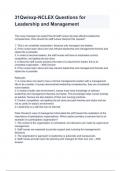31Qw/exp-NCLEX Questions for
Leadership and Management
The nurse manager has asked that all staff nurses develop effective leadership
competencies. How should the staff nurses interpret this request?
1. This is an unrealistic expectation, because only managers are leaders.
2. If the nurses learn about and use relevant leadership and management theories and
styles this is possible.
3. In order to become leaders, the staff nurses will have to emphasize control,
competition, and getting the job done.
4. Unless the staff nurses possess the traits of a natural born leader, this is an
unrealistic expectation. - ANS Answer:
2. If the nurses learn about and use relevant leadership and management theories and
styles this is possible.
Rationale:
1: A nurse does not need to have a formal management position with a management
title to be a leader; if nurses demonstrate leadership competencies, they are considered
nurse leaders.
2: In today's health care environment, nurses must have knowledge of relevant
leadership and management theories and styles. This knowledge helps nurses emerge
as leaders. Nurses are also leaders of their own nursing practices.
3: Control, competition, and getting the job done are past theories and styles and are
not as useful in today's environment.
4: Leadership is a skill that can be learned.
Peter Drucker's view of management stimulated the shift toward the realization of the
importance of participatory organizations. Which option provides a scenario that is an
example of a participatory organization?
1. The control of the organization is centralized, and decisions are made by upper-level
management.
2. Staff nurses are expected to provide support and nurturing for management's
decisions.
3. The organization's approach to leadership is autocratic and bureaucratic.
4. Staff nurses provide input into planning and changes for their own unit. - ANS
Answer:
,4. Staff nurses provide input into planning and changes for their own unit.
Rationale:
1: In participatory organizations, the control of the organization is decentralized and
many decisions are made by those "on the front lines" of the organization.
2: The theory is that the staff should be nurtured to promote greater leadership
competency.
3: According to Drucker, when staff participate in the core functions of management, the
organization is more effective.
4: According to Drucker, when staff participate in the core functions of management
such as planning and changes for their own units, the organization is more effective.
Which behavior demonstrates the nurse's competency as an emotionally intelligent
leader?
1. The nurse is proficient in technical skills.
2. The nurse relies on policies, not options.
3. The nurse supports team members.
4. Productivity is not a major concern. - ANS Answer:
3. The nurse supports team members.
Rationale:
1: While technical skill is important for all nurses, it is not a hallmark of a competent
leader.
2: Chaos theory states that solutions are not always clear and policies might not always
be applied easily; other options might need to be considered.
3: In Emotional Intelligent theory, team members support each other and feel supported
by the team leader.
4: This statement reflects the country club leadership style.
Describe the primary focus of a manager in a knowledge work environment.
1. Developing the most effective teams.
2. Taking risks.
3. Routine work.
4. Understanding the history of the organization. - ANS Answer:
1. Developing the most effective teams.
Rationale:
1: The most important focus of this manager is on developing and supporting effective
teams, utilizing the knowledge of many.
, 2: Risk taking is a part of knowledge work, but is not the most important of this
manager's tasks.
3: Knowledge work is a combination of routine and non-routine work, so the manager
will have focus on the routine. This is not the manager's most important focus.
4: Understanding the history of the organization is important as it will help the manager
work within the organization, but it is not the most important focus.
A very young nurse has been promoted to nurse manager of an inpatient surgical unit.
The nurse is concerned that older nurses may not respect the manager's authority
because of the age difference. How can this nurse manager best exercise authority?
1. Use critical thinking to solve problems on the unit.
2. Give assignments clearly, taking staff expertise into consideration.
3. Understand complex health care environments.
4. Maintain an autocratic approach to influence results. - ANS Answer:
2. Give assignments clearly, taking staff expertise into consideration.
Rationale:
1: Critical thinking is important for every RN, not just a manager 2: Giving clear
assignments is a characteristic of authority. The young nurse who takes staff expertise
into consideration when making assignments is likely to be more successful in leading
the group.
3: Nurse managers do work in complex health care environments but must create an
appropriate organizational environment as a way of exercising authority.
4: In autocratic leadership, one person has all of the power. This is not a good approach
for a younger leader to adopt when working with a group of older, more experienced
nurses.
What statement, made in the morning shift report, would help an effective manager
develop trust on the nursing unit?
1. "I know I told you that you could have the weekend off, but I really need you to work."
2. "The others work many extra shifts, why can't you?"
3. "I'm sorry, but I do not have a nurse to spare today to help on your unit. I cannot
make a change now, but we should talk further about schedules and needs."
4. "I can't believe you need help with such a simple task. Didn't you learn that in
school?" - ANS Answer:
3. "I'm sorry, but I do not have a nurse to spare today to help on your unit. I cannot
make a change now, but we should talk further about schedules and needs."
Rationale:
1: To develop trust, managers who make promises to staff must keep the promise.




